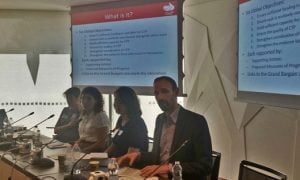Walking the talk: The Grand Bargain & Cash Transfer Programming

Last week, I attended the first meeting of the ‘Grand Bargain cash workstream’ at the WFP office in Rome, and met with 70 people representing the 51 signatories to the Grand Bargain. These signatories include all the major parties involved in CTP across the globe, and represent the majority of the international humanitarian sector.
My takeaways: “the collective will to do more and better CTP is there, but it will take the whole sector working together to make it a reality.”
So how do we do this?
We do this by upgrading capacity for cash across all actors in the CTP sector. We do this by identifying and implementing a common set of practical actions and language. And we do this by ensuring appropriate levels of monitoring, evaluation and accountability are in place to both evaluate success of programming, and to reassure donors that it’s a worthwhile method of action.

Ambition vs reality – breathing life into the Grand Bargain
Currently, only 7% of humanitarian aid is given as CTP, and this is far too low. Once we can build it properly into the system, we have the opportunity to increase this by billions of dollars a year.
We are still ‘crunching the gears’ between our ambition and our reality. We are still questioning who will lead the charge to ensure we breathe life into the commitments we made in the Grand Bargain.
At the forum in Rome, we noted several key highlights that will help this advance in CTP to happen:
- Operational organisations are currently doing the tough work of upgrading their systems and retraining their staff to do CTP well.
- Humanitarian Clusters have an important role to play in figuring out the best ways of using CTP in emergency situations.
- Donors are figuring out how to build cash into their ways of working.
- As a sector, we are collectively strengthening the evidence base for CTP.
- We are showing a collective willingness to come together, and we must keep up the momentum once forums like this are over.
All of these areas are part and parcel of doing CTP well, and they are all a focus of the the CALP Network.
At the CALP Network, our mission is to radically increase the scale and quality of CTP, by providing best-practice solutions and learnings that the whole humanitarian sector can use. One major piece of work we’ve done recently is a Global Framework for Action1 to act as a collective roadmap for how to do CTP – I am glad to report that this was very well received in Rome.
The framework has been carefully designed to provide a collective, comprehensive and action-oriented road map for humanitarian actors to scale up cash programming. The CALP Network believes that this can play a significant role in realising the potential of cash for people in crisis around the world, and will help to drive the collective action that we need.
A second focus for the CALP Network has been a glossary on CTP, which was adopted in Rome as the basis for measuring cash transfer programmes. It’ll be used as the basis for ongoing work with OCHA’s Financial Tracking Service and the IATI Standard. This is a great step, building on the vast amount of collective wisdom & effort contained in the glossary, made possible by us working together.
| A golden time for cash
This is a golden time for cash transfer programming. There is incredible opportunity to make the most of this powerful way of providing aid – at a greater scale and with greater effect than ever before
There is enormous potential to make better use of unrestricted cash transfers, particularly for basic needs. We should expect billions more dollars of aid to be delivered as cash in the coming years. Now is the time to roll up our sleeves and reform our machinery to achieve this goal as soon as we can. CTP has a crucial role to play in improving how we do aid. While CTP is unlikley to revolutionise the entire humanitarian sector, it is a major step forward, allowing us to meet the over-riding ethical imperative that humanitarian aid achieves as much as it possibly can for people in desperate need around the world. |
Where to next? The Global Cash Forum!
As we come together as a sector and build a collective understanding on CTP, we will keep up the well-needed dialogue. On 28 June, the CALP Network is hosting the Global Cash Forum, in Geneva, to create a space to think together, learn together, and come to an agreement on how we shape future responses, and create a coordinated leadership about how best practice in CTP. If you want to help shape this dialogue, we invite you to join us at the Global Cash Forum, by registering here.
We need to ensure that this political will is encouraged, and that we continue to work collectively to achieve our aims. The Global Cash Forum is the natural next step to continuing the discussion, and reaching agreement on where to next.
We are looking forward to continuing to support the Grand Bargain cash workstream, and working in different ways with people across the humanitarian sector to make cash programming standard practice.
1 the CALP Network’s Global Framework for Action consolidates the major commitments and recommendations made to improve cash transfer programming (CTP) in humanitarian response during 2015 and 2016. It aggregates core content from the Grand Bargain, ECHO’s 10 Principles, the High Level Panel report, the Strategic Note on Cash Transfers and the Agenda for Cash. It is organised around six practical objectives:
- Ensure sufficient funding is available for cash transfer programming.
- Ensure cash is routinely considered, alongside other tools.
- Build sufficient capacity for cash transfer programming.
- Ensure the quality of cash transfer programming.
- Strengthen coordination of cash transfer programming.
- Strengthen the evidence base and invest in innovation.
Main image: Anna Ridout – Oxfam


